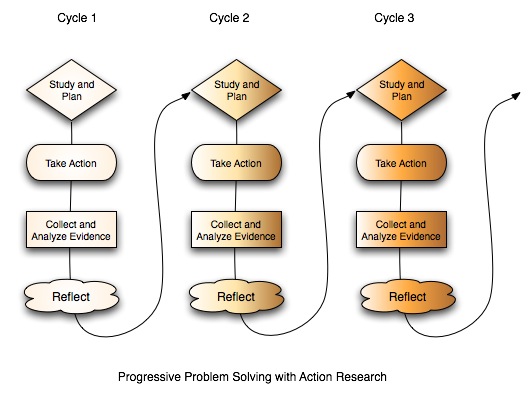 www.google.com
www.google.com www.google.com
www.google.com
Research?
The basic notion of research is to conduct a systematic inquiry. Researchers seek to answer questions and gather information using systematic procedures. This captures, in a broad sense, the core goal of traditional research in education.Researchers use procedures to collect and analyze data. These procedures are referred to as research methods. Two broad categories of research methods include qualitative and quantitative. Research designs are understood as the plan that will be used to carry out the study.
|
Qualitative The focus of qualitative research centers on gaining a rich understanding of the phenomenon being studied. Qualitative research studies focus on a broader and more holistic approach to data collection. Typically, the data that is collected and analyzed in qualitative research studies is in the form of narrative data. Data collection methods include observations and interviews. Typically, qualitative research methods use an inductive approach to reasoning.
|
Quantitative The goal of quantitative research is to establish relationships and explain causes in changes of measured outcomes. This type of research method is characterized by manipulation and control over variables in a study. In quantitative research studies numerical data is collected and analyzed. Data collection methods include surveys, questionnaires, and rating scales.Typically, quantitative research methods use a deductive approach to reasoning.
|
Typically, researchers in traditional education can be viewed as somewhat removed from the environment they are studying(Mertler, p. 7). Action research differs from traditional research in education in that it is practitioner-based research. More specifically, action research is a systematic inquiry into one's own practice. This quality of action research leads the results to be informative, immediate, as wells as directly applicable. The core of action research rests in improving practice in immediate ways within one's classroom. Action research uses both qualitative and quantitative research methods. Some of the strengths and qualities of action research include the collaborative nature in which educators work together to improve their own practice, practical in nature, systematic approach, as well as open-minded.
|
Action Research The overarching goal of action research is a desire to make things better, improve some specific practice, or correct something that is not working. Although there is various models of action research, the process of action research is cyclical in nature with reflection being an integral element in the process.
|
Riel's Action Research Model


www.google.com
www.google.com
|
Mertler's Action Research Model Stages The planning stage
The acting stage
The developing stage
The reflecting stage
|
Courses and sample work
ETEC 543: Technology and Learning I
As someone who is interested in entering the teaching profession I found learning about action research enlightening. Action research concerns research that is done by teachers for themselves. This is the key difference between this type of research and traditional research. Learning about action research has made me realize the potential benefits for teachers and their students. Teachers need to be able to evaluate and reflect upon how they teach students in their classrooms. The cyclical nature of action research means there is no clear end, rather teachers may go through subsequent cycles of implementation, evaluation, and revision. The group project for this course centered on a collaborative nature in which we were all a part of working through and refining the steps and decisions made in the action research process. The group research project focused on examining the effects of utilizing Learning Management System(LMS) on parent involvement of elementary school children.
I extracted the literature review I did for this group project, but kept the rest of the report in its original format.
ETEC 614: Need Assessment: Issues and Techniques
In this course I was able to understand the process of conducting a needs assessment. A needs assessment is a type of evaluation involving a process of determining how to close a learning or performance gap. This course was especially interesting because I was able to conduct a needs assessment for a real operating business. I interviewed the owner, managers, and employees. I also collected existing documents related to the performance gap this business was experiencing. A part of this process involved researching related literature to inform the needs assessment. It was especially amazing to see the different components of my research come together in a report, as well as propose a recommendation/solution to the performance gap I was addressing for the business. I am interested in teaching, so knowing how to conduct a needs assessment has potential value and use for professional development and training in education. I would be able to offer my knowledge about how to conduct a needs assessment in order to determine if a performance or learning gap existed, along with the process of how to close this gap.
Needs Assessment Report
ETEC 643: Technology and Learning II
This course took my on a path to understanding how to conduct and fine tune my research. I was able to work through how to formulate "good" research questions, as well as align these questions with an appropriate research design and data collection methods to answer these questions. I conducted research that focused on the effects of using the math program Big Brainz for math facts practice. This research involved working with and gathering data from two second grade teachers and their students. I employed a mixed method research design.
Mertler, C.A. (2014). Action Research: Improving Schools and Empowering Educators (4th ed.).
Thousand Oaks, CA: Sage Publications.